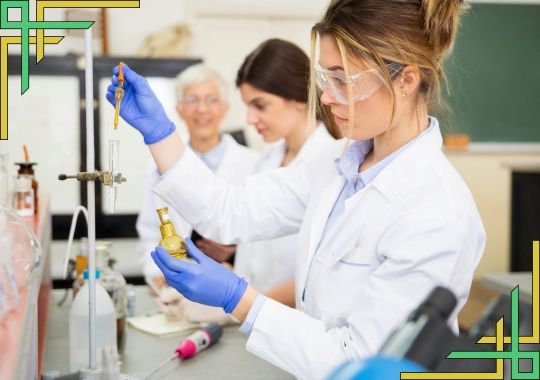Chemistry is a broad field. There are so many different applications of chemistry in our everyday lives that it can be hard to keep track! From the food we eat, to the clothes we wear, and even the way cars use chemistry to produce energy - there is no doubt that chemistry is an essential part of our daily lives.
Chemistry in our Food
Chemistry is used in food in many ways. One way is to make sure the food we eat is safe. Chemists test foods for toxins and contaminants that can make us sick. They also work to develop new food safety technologies, like packaging that keeps food fresh longer.
Another way chemistry is used in our food is to make it taste better. Chemists develop new flavorings and add them to foods to make them more enjoyable to eat. They also work to enhance the existing flavors in foods, like making a tomato taste sweeter or improving the aroma of coffee.
Finally, chemistry is used in food to help it look its best. Chemists develop dyes and other chemicals that are added to foods to improve their appearance. This can make fruits and vegetables more vibrant and appealing, or it can help baked goods maintain their color and shape during storage.
Chemistry is the study of matter and the changes it undergoes. Everything in the universe is made up of matter, so everything is affected by chemistry. That includes the food we eat!
The composition of food can tell us a lot about its nutritional value. For example, carbohydrates are a major source of energy for the body, while fats provide essential nutrients and help with cell growth. Proteins are needed for muscle development and repair.
All these nutrients are essential for our health, but they wouldn't be able to do their jobs without the help of chemicals. Enzymes are chemicals that help break down food so that our bodies can absorb the nutrients. Vitamins and minerals are also essential for good health, and they're all chemical compounds.
So next time you're enjoying a delicious meal, remember that there's a lot of chemistry going on behind the scenes!
Chemistry in our Skin
Your skin is your largest organ and it’s made up of many different layers. The top layer, the epidermis, is made up of cells that are held together by a protein called keratin. Keratin is also what makes up your hair and nails.
The middle layer of your skin, the dermis, contains blood vessels, sweat glands, and hair follicles. This layer also has collagen and elastin fibers which give your skin its strength and flexibility.
The bottom layer of your skin, the subcutaneous tissue, is made up of fat and connective tissue. This layer helps to keep your skin attached to your body and provides insulation.
Your skin protects you from harmful toxins and bacteria, keeps you warm, and helps you regulate your body temperature. It’s also an important part of the immune system.
All of these layers work together to keep you healthy and looking good!
Chemistry In our Environment
Chemistry is all around us and plays a vital role in our daily lives. It is the study of matter and the changes it undergoes. Without chemistry, life as we know it would not be possible. Here are some ways chemistry is used in our everyday lives:
-The air we breathe is made up of nitrogen, oxygen, and other gases that make up our atmosphere.
-The food we eat contains carbohydrates, proteins, fats, vitamins, and minerals that are essential to our health.
-The water we drink contains minerals that are important for our bodies to function properly.
-The clothes we wear are made of natural fibers like cotton and wool, or synthetic fibers like polyester and nylon.
-The cosmetics we use contain chemicals that help improve our appearance.
-The cleaning products we use contain chemicals that remove dirt and grime from surfaces.
The environment is important to chemistry because it provides the raw materials that chemists use to create new products and processes. The air, water, and soil are all major sources of the elements that make up the periodic table. Even the human body is made up of chemicals!
Chemistry is also important to the environment because it can help us to understand and solve environmental problems. By studying how chemicals interact with each other and with the world around them, chemists can develop new ways to clean up pollution, conserve resources, and generate energy.
Chemistry in our Body
The human body is made up of chemical elements, and the study of how these elements interact is called chemistry. Chemistry is important to our bodies in many ways.
For example, the food we eat is broken down by enzymes in our digestive system into molecules that our cells can use for energy. The oxygen we breathe in is used by our cells to create ATP, the energy that powers our muscles. The water we drink helps to keep our bodies hydrated and functioning properly.
Chemistry also plays a role in our moods and emotions. The brain produces neurotransmitters that affect our mood and behavior. These neurotransmitters are made up of chemicals, and their levels can be affected by what we eat and drink, as well as by stress and other factors.
So, as you can see, chemistry is all around us and plays an important role in our lives!
Household Chemicals
Household chemicals are a part of our everyday lives. They are in the cleaning products we use to keep our homes clean and in the personal care products we use to take care of ourselves. Chemistry is a big part of making these products work effectively.
Most household cleaning products contain some type of acid or base. Acids are used to remove stains and break down dirt, while bases are used to kill bacteria and mold. The two most common acids used in household cleaners are vinegar and lemon juice. The most common bases used in household cleaners are baking soda and ammonia.
Personal care products also rely on chemistry to work effectively. Soaps and shampoos contain molecules that help them clean our skin and hair by breaking up dirt and oil. Toothpaste contains fluoride, which helps prevent cavities by strengthening tooth enamel. And sunscreen contains chemicals that absorb ultraviolet light, protecting our skin from damage.
So next time you reach for a household product, remember that there’s a lot of chemistry involved in making it work!
Beauty Products
Whether you’re putting on makeup, using shampoo, or spraying perfume, you’re using chemistry. Even though it’s not always obvious, chemistry is involved in many aspects of our daily lives.
In fact, beauty products are full of chemicals. For example, did you know that shampoo is mostly made of detergent? That’s right, the same stuff you use to wash your clothes is also used to clean your hair.
Detergent is a surfactant, which means it lowers the surface tension of water so it can more easily penetrate fabric and remove dirt and oil. When applied to hair, detergent removes sebum (an oily substance produced by the sebaceous glands) and dirt from the scalp and strands.
But detergent alone can be harsh on hair, so manufacturers often add conditioning agents to offset its drying effects. These ingredients help keep hair soft, shiny, and manageable.
So there you have it! The next time you’re using your favorite beauty products, take a moment to think about all the chemistry that goes into them!
Medicine
Chemistry is the study of matter and the interactions between different substances. It's present in everything from the food we eat to the air we breathe. And it's not just limited to physical objects; chemistry also plays a role in our emotions and behavior.
In medicine, chemistry is used to develop new drugs and treatments, as well as to better understand how the human body works. Chemistry is also used in diagnostic testing, such as blood tests and X-rays. By understanding the chemical makeup of a substance, doctors can determine whether it's safe for patients to take or if it will interact with other medications.
conclusion
Chemistry is all around us and influences everything we do, from the food we eat to the air we breathe. It's important to be aware of the role chemistry plays in our everyday lives, so that we can make informed decisions about the products we use and how we interact with the world around us.
Related Article











